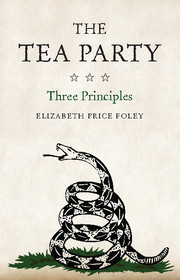4 - Constitutional Originalism
Published online by Cambridge University Press: 05 March 2012
Summary
Tea partiers revere the constitution and its framers. They're are often spotted carting around pocket Constitutions, studying founding-era documents such as the Federalist Papers and Anti-Federalist Papers, and citing constitutional text in ways more sophisticated than many lawyers. This zeal has led several liberal-progressive pundits and reporters to analogize Tea Party constitutional reverence to Bible study. In a July 2010 essay in Mother Jones, for example, Stephanie Mencimer proclaimed that Tea Partiers study the Constitution “like evangelicals study the Bible.”
The Bible study comparison is initially amusing – ha-ha, there go those crazy Tea Partiers again, studying the Constitution. But on closer inspection, the Bible-study analogy – and its genesis (pardon the pun) in the liberal-progressive community – is both revealing and disturbing. If studying the Constitution is like studying the Bible, what does this imply, at least in the mind of a liberal or progressive? It means that Tea Partiers are taking the Constitution too seriously, studying it with a religiosity and fervor that is, well, a bit embarrassing. Why “study” the Bible in any serious way, progressives ponder, when it's all just a giant metaphor for basic secular truths? Does anyone really believe that the universe was created in seven days? Or that the first humans lived in a Garden of Eden and were named Adam and Eve? Such a “literal” reading of the Bible is just a waste of time.
- Type
- Chapter
- Information
- The Tea PartyThree Principles, pp. 167 - 217Publisher: Cambridge University PressPrint publication year: 2012



